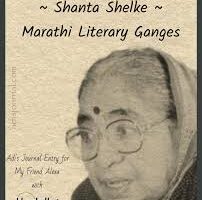Shanta Janardan Shelke was born on October 12, 1922 in the village of Indapur in Maharashtra. Her family owned a huge wada (residence) in Pune’s Manchar village. Her grandfather was a school teacher, so education was automatically encouraged. Her father was an officer in the forest department. Because his job required the family to move often, her childhood was spent in various places like Chikhaldara, Nandgaon, and Kharadi near Pune.
Shanta Shelke was the eldest of five siblings. She called her father ‘Dada’ and her mother ‘Vahini’. As a child, she spent a lot of time with her mother and picked up some of her attributes such as her soft nature and a love for painting and reading. She spent her vacations at her grandparents’ wada, where she would listen to various traditional songs, couplets, and hymns. These experiences further nurtured an interest in poetry and reading that reached fruition through her poetry publications as an adult.
Shelke’s father passed away in 1930 due to jaundice when she was just nine years old. As a consequence, the whole family shifted to her uncle’s house in Pune. She was in the fourth standard at the time. After changing a few schools, she finally completed her matriculation in 1938 from Huzurpaga Girls’ High School. The culture of the school and the education she received there made a great impact on her.
Shelke went on to pursue her BA from Sir Parashurambhau College in Pune. Her first poem, which was for children, was published in 1941 in the magazine Shalapatrak when she was in the first year of her degree. Her early work was influenced by Madhav Julian, who was a member of the Ravikiran Mandal.
Professors like S.M. Mate, K.N. Vatve, and R.S. Jog encouraged Shelke to devote her time to reading poems and books apart from academics. Her interest in literature increased during this period, and she wrote an article for the college magazine, which Mate reviewed positively. Eventually, Shantabai started writing poems and articles regularly. Immediately after her graduation, a collection of her writing, Mukta Ani Itar Goshti, was published. Mate wrote a prelude for the book and expressed strong opinions about it.
In 1944, Shelke completed her MA in Sanskrit, becoming the first woman from the Devang Koshti community to complete her higher education. She also received the Tatyasaheb Kelkar Gold Medal from Tatyasaheb himself. After her master’s degree, she moved to Mumbai. She initially worked at Acharya Atre’s magazine, Samikshak, and later started working for the weekly magazine Navyug and the newspaper Dainik Maratha. During this period, she gained experience in various types of writing and also learnt many aspects related to literature. Shelke then took up employment as a professor at Nagpur’s Hislop College, Mumbai’s Ruia College, and Mahashri Dayanand College.
Over her career, Shelke wrote books in various formats such as stories, novels, songs, movie songs, and children’s literature. Her poetry, which was the medium that she was most comfortable in, was children-friendly and situational. Her first music album, Toch Chandrama Nabhat, was also warmly welcomed by audiences.
Shelke also wrote Marathi songs for well-known music directors like Bhalaji Pendharkar, Dinkar D. Patil, Lata Mangeshkar, Sudhir Phadake, Hrudaynath Mangeshkar, and Salil Chaudhari. Her songs ‘Punvecha Chandrama Ala Ghari’ and ‘Hi Chal Turu Turu, Udati Kes Bhuru Bhuru’ are still popular.
Hrudaynath Mangeshkar’s most famous compositions were Koli songs such as ‘Vadal Vara Sutala Ga’, ‘Valhav Re Nakhava’, and ‘Raja Saranga Mazya Saranga’. To write these songs was a challenge for Shantabai, who had never seen the ocean.
Shelke also wrote songs composed by Jitendra Abhisheki for plays like Vasavadatta and He Bandh Reshmache, and for the movie Garambicha Bapu. Her first poetry collection, Varsha, was published in 1947 and the second, Rupasi, was published in 1956. Both of these works show the influence of the Ravikiran Mandal; however, Shelke herself considered them to be bad work. Her other published collections include Godan (1975), Anolakh (1985), Kalyanche Divas, Fulanchya Rati (1986), Janma Janhavi (1990), Purvasandhya (1996), Ityartha (1998), and Kinare Manache.
With time, her poems became more intricate, thoughtful and mature. Her later poems explore subjects like the sweet memories of childhood, heartbreak, the incompleteness of human life, loneliness, existential crises, and the secrets of nature. She wrote poems in specific metres and wrote songs for children and adults, sonnets, and abstract poems with the same ease. She became popular as a lyricist who wrote excellent and imaginative movie songs.
In 1996, Shelke presided over the 69th Akhil Bharatiya Sahitya Sammelan (All India Literary Conference) organised in Alandi. She was awarded the Su La Gadre ‘Matoshri’ Award (1994) by Mulund’s Maharashtra Mandal, and Pune’s ‘Gadima’ Award (1995) for Excellent Lyricist.
Shelke’s most memorable works include collections and novels such as Mukta (1944), Gulmohor (1949), Premik (1956), Anubandh (1980), Punarjanm (1950), Odh (1975) (based on the life of the Devang Koshti community), Maza Khel Mandude, Shahanchya Duniyet (1959), Pavsaadhich Paus (1985), and Samsmarane (1990). Her other writings include an autobiography, Dhulpati (1982), the character sketches Vadildhari Manse (1989) and Aloukik (1993), and a collection of her newspaper columns, Ek Pani (1989).
In addition, she also published Marathi translations of English novels as well as Sanskrit books like Sanskrit Subhashita Ratna Bhandara and Meghdoot and Japanese haiku poems named Panyatil Paklya. Her children’s literature includes books like Chimanchara (1960) and Thui Thui Nach Mora (1961).
Shelke believed that her ‘real identity would always be the person who loves literature’. She passed away on June 9, 2002.
Authored by Mangala Gokhale.


